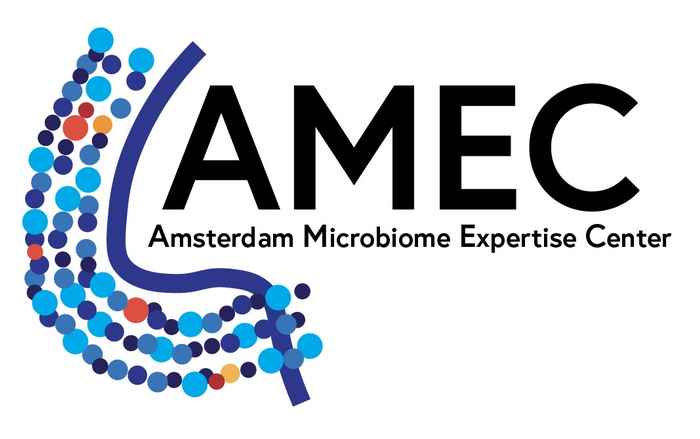Collaboration

Collaboration for companies
For companies interested in AMEC, there are numerous opportunities for collaboration. Some of the ways companies could collaborate with AMEC are:
-
1. Research Partnerships
- Joint Research Projects: Companies can engage in joint research projects, leveraging their expertise to explore new microbiome-related discoveries. This could involve co-developing new technologies, methodologies, or products related to microbiome science.
- Clinical Trials: Collaboration in clinical trials can be beneficial for companies developing therapeutics or interventions targeting the microbiome. AMEC's expertise and access to patient populations through its links with the Amsterdam University Medical Centers (A UMCs) as well as the Amsterdam Centre for Dentistry (ACTA) can facilitate such studies.
-
2. Consultancy Services
- Expert Guidance: Companies can seek expert consultancy from AMEC's researchers and scientists. This might include guidance on microbiome study design, data analysis, or specific challenges within the field.
- Problem-Solving: AMEC can help solve specific microbiome-related problems or optimise processes within a company's R&D framework.
-
3. Access to resources
- Biobanks and Databases: Companies can gain access to AMEC's extensive microbiome biobanks and databases, which can be valuable for research and development purposes.
- Technological Platforms: Utilisation of AMEC's state-of-the-art technologies and platforms for microbiome analysis, such as anaerobic culturing facilities, organ on a chip platforms genome and RNA sequencing, proteomics, metabolomics and bioinformatics tools.
-
4. Workshops and Training
- Educational Programs: Companies can participate in or sponsor workshops, training sessions, and seminars conducted by AMEC's scientists. These programmes can help enhance the microbiome knowledge and skills of their employees.
- Internships and Fellowships: Opportunities to support or host internships and fellowships for students and researchers affiliated with AMEC, fostering talent development.
-
5. Funding and Sponsorship
- Sponsorship Opportunities: Companies can sponsor specific research projects or events at AMEC. Sponsorship can help drive innovation and gain visibility in the microbiome research community.
- Joint Grant Applications: Collaborating on grant applications can provide funding opportunities for projects of mutual interest.
-
6. Networking and Collaboration Platforms
- Industry-Academia Networks: Participation in networks that bring together industry and academia to share knowledge, challenges, and advances in microbiome research.
- Conferences and Symposia: Engaging in conferences and symposia organised by or involving AMEC to present research, exchange ideas, and form new partnerships.
Collaboration for researchers
AMEC offers numerous collaboration opportunities for researchers. Engaging with AMEC provides a platform for innovative research and the potential to contribute to significant advancements in the microbiome field. Some collaboration options and ways researchers can engage with AMEC are:
-
1. Research Partnerships
- Joint Research Projects: Researchers can propose and collaborate on projects that align with AMEC's focus areas, which include understanding the role of the microbiome in health and disease, developing new microbiome-based therapies, and advancing microbiome technology.
- Interdisciplinary Teams: AMEC encourages collaboration between researchers from different disciplines, fostering innovation through diverse perspectives and expertise.
-
2. Access to Facilities and Resources
- Core Facilities: Collaborators can access state-of-the-art facilities and equipment for microbiome analysis, including sequencing technologies, proteomics, metabolomics, imaging and bioinformatics platforms.
- Data Sharing: AMEC facilitates data sharing among researchers to enhance collaborative efforts and drive discoveries.
-
3. Funding Opportunities
- Joint Grant Applications: Researchers can collaborate on grant proposals to secure funding from national and international sources. AMEC provides support in identifying suitable funding opportunities and preparing applications.
-
4. Workshops and Conferences
- Scientific Meetings: AMEC regularly hosts conferences, workshops, and seminars that provide networking opportunities and foster collaboration among researchers.
- Training Sessions: Researchers can participate in training sessions and courses to learn about the latest techniques and advances in microbiome research.
-
5. Industry Collaboration
- Partnerships with Companies: AMEC collaborates with industry partners to translate research findings into practical applications. Researchers can engage in projects with pharmaceutical and biotechnology companies to develop microbiome-related products and solutions.
-
6. Publication and Dissemination
- Collaborative Publications: Researchers are encouraged to publish joint research findings in high-impact journals. AMEC supports the dissemination of research through various channels.
-
7. Education and Outreach:
- Mentorship Programs: Experienced researchers can mentor early-career scientists and students, fostering the next generation of microbiome researchers.
- Public Engagement: Collaborators can participate in outreach activities to raise awareness about microbiome research and its implications for society.
-
8. Networking Opportunities
- Research Networks: AMI connects researchers with a broad network of experts and institutions, facilitating international collaborations and exchanges.
Contact us
Companies and researchers interested in collaborating with AMEC can reach out directly to Stanley Brul (lead researcher), Sahar El Aidy, or Harro Bouwmeester for agriculture-related inquiries.